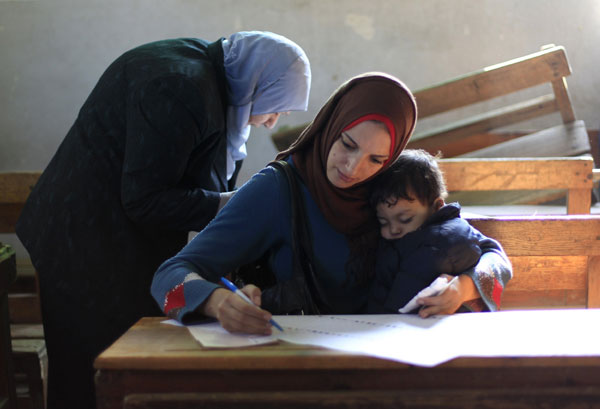Voters queue in Egypt's election
Updated: 2011-11-29 07:52
(China Daily)
|
|||||||||
 |
|
An Egyptian woman reads a ballot before casting her vote at a polling station during the parliamentary election in Cairo on Monday. Egyptians queued up to vote in the first big test of a transition born in popular revolutionary euphoria that soured into distrust of the generals who replaced their leader, Hosni Mubarak. Photo by Ahmed Jadallah / Reuters |
CAIRO - Egyptians flocked to polling stations on Monday as part of a transition born in revolutionary euphoria but now tinged by distrust of the generals who replaced former president Hosni Mubarak.
"This is the first real election in 30 years. Egyptians are making history," said Walid Atta, 34, an engineer waiting to vote at a school on his way to work in Alexandria.
In the nine months since a popular revolt ended Mubarak's 30-year rule, political change in Egypt has faltered, with the military apparently more focused on preserving its power and privilege than on fostering democratic transformation.
Frustration erupted last week into bloody protests that cost 42 lives and forced the army council to promise civilian rule by July after the parliamentary vote and a presidential poll, now expected in June - much sooner than previously envisaged.
There were no reports of serious election-day violence. But scuffles among women voters erupted at one Alexandria polling station that opened late because ballot papers had not arrived.
Tents of protesters demanding an immediate end to army rule still stood in Cairo's Tahrir Square, but after a heavy overnight rain, less than 100 demonstrators remained.
At least 1,000 people were waiting in line outside one polling station in the central Cairo district of Zamalek when voting started at 8 am. The line stretched around the block. Posters of candidates and parties festooned the street.
"We are very happy to be here and to be part of the election," said Wafa Zaklama, 55, voting for the first time in a parliamentary election.
In rain-washed Alexandria, Egypt's second city, men and women voted in long, separate queues. "I am here to cast my vote. This is a national duty in this time of crisis," said Abdullah Metwali, 55, voting on his way to work.
Campaign posters for Islamist parties, such as the Muslim Brotherhood's Freedom and Justice Party, and the Salafi Nour Party and the moderate Wasat Party festooned streets nearby. Troops outnumbered police guarding polling stations.
In an eastern suburb of Cairo, a queue of women voters snaked for hundreds of meters. One woman said: "I think if I went to work and came back, this line still wouldn't have moved."
A little girl asked her mother: "Where did all these people come from?" Her mother replied: "Look my child, this is a small picture of what millions like us are doing. This is what you will have when you grow up: a voice."
The segregated voting for men and women in Alexandria and many other places was a reminder of the conservative religious fabric of Egypt's mainly Muslim society, where Coptic Christians comprise 10 percent of a population of 80 million.
About 17 million Egyptians are eligible to vote in the first two-day phase of three rounds of polling for the lower house, which will be completed on Jan 11. Under a complex electoral system, voters pick both party lists and individual candidates.
The return of protesters to Tahrir Square and last week's violent street confrontations clouded the run-up to Egypt's first free election in decades.
Shadi Hamid, research director at the Doha Brookings Center, said the vote was the first benchmark in Egypt's transition. "It will also tell us how much Egyptians are invested in this political process. If turnout is low, it will mean there is widespread disaffection among Egyptians."
Early signs suggested Egyptians were enthused by the novelty of a vote where the outcome was, for a change, not a foregone conclusion.
Parliament's lower house will be Egypt's first nationally elected body since Mubarak's fall, and those credentials may enable it to dilute the military's monopoly of power.
Yet army council member General Mamdouh Shahin said on Sunday the new assembly would have no right to remove an army-appointed government using its "presidential" powers.
Judges were supervising polling stations to guard against the ballot-stuffing, intimidation and other abuses of the past.
"By the end of the day, the ballot box, room and the whole school will be sealed with red wax," said Mohamed Refaat, a judge who was supervising a polling station in Alexandria.











